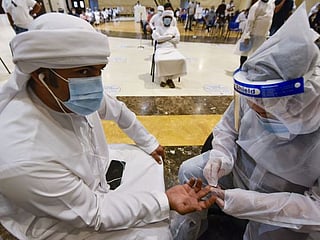COVID-19: Why UAE residents need to get vaccinated for flu this season
UAE doctors advise all residents to get the vaccine in view of the COVID-19 pandemic

Dubai: As talk about viruses and vaccines goes mainstream, people have been asking questions on why they should really get themselves injected with the influenza vaccine?
How does a flu vaccine work?
How does a tiny jab with miniscule liquid actually protect an individual from the ill effects of a virus that produces respiratory distress and fever that causes 200,000 deaths every year globally?

Dr Sundar Elayaperumal, specialist microbiologist at Burjeel Hospital Abu Dhabi, explained: “A vaccine is either the introduction of an inactivated virus or a live yet attenuated virus in the body. Attenuation is a process by which the virulence of the virus is made weak. When this weaker version is injected into the body, our immune system produces anti-bodies in response. These anti-bodies provide a protection from contracting the disease. In case of Influenza, the vaccination is a trivalent strain containing the Type A strains of H1, N2 and H1N1 as well as Type B viruses.
Why do we need to take this vaccination every year?
People who are injected with these live but attenuated strains (weakened) usually develop antibodies that provide protection from six months to a year. Therefore, it becomes necessary for people to take the vaccination annually as anti-bodies produced in response to the vaccination either become weaker or disappear over that period. Besides, every season, we have new mutated strains of the virus. Therefore, fresh vaccination is necessary.”
Who should take this vaccine?
Dr Moeena Zain, consultant, Infectious Diseases, American Hospital, Dubai, said: “The flu vaccine must be taken by all classes of people. But it must specially be taken by frontline health-care workers who are exposed to influenza through patients, by children below five years, pregnant women, people who are immune-compromised such as those suffering from cancer or those who may have a transplanted organ, and senior citizens. These categories of people are more susceptible to being infected by the Influenza virus.
Dr Elayaperumal cautioned that although a flu vaccination provides a strong possibility of protection against Influenza, there is still a chance of being affected by Influenza-like illnesses with high levels of exposure, but that can be overcome by those who are vaccinated. “More than 50 per cent people gain immunity when vaccinated for influenza, but frontline workers and those with weak immunity can still have flu-like symptoms despite the vaccination if they have a high level of exposure to the flu virus. So one needs to be careful.”
Can the flu virus protect against COVID-19?
Both Dr Elayaperumal and Dr Zain categorically ruled out any protection against COVID-19 through a flu vaccine. Dr Elayaperumal elaborated: “Although there have been some hypothesis presented to this effect, there is not enough research or evidence to prove this. The antibodies produced in response to the Influenza vaccine only affect the haemoagglutinin and neuraminidase glycoproteins. COVID-19 caused by SARS-COV2 cannot be impacted by this vaccination. The only thing is that since both impact the respiratory system and one can get flu and COVID-19 together, it is advisable to take the flu vaccine to at least minimise the possibility of being affected by flu.”

Dr Zain added: “Since this vaccine contains the Influenza virus, immunity is specific to that virus only. It will not offer protection against the COVID-19 infection.”
Why do some people oppose flu vaccination?
Some people believe that vaccination per se is evil and can expose one to other immune diseases. However, both Dr Elayaperumal and Dr Zain refuted such belief, attributing it to fake propaganda and a misinformation campaign.
Dr Zain said: “Vaccination is considered one of the few interventions that has actually changed the course of transmissible diseases in history. Despite a huge amount of evidences to suggest that flu vaccines are safe, majority of the objections stem from ignorance about the science behind it,” she said.
The fear-mongering about flu vaccine particularly stems from the fact that nearly 70 per cent of these are made in fertilised eggs of hens. The Candidate Vaccine Virus is incubated and injected in the fertilised egg and allowed to replicate there before the fluid is extracted from the egg. So people with egg allergy have reported reactions after the vaccination as it sometimes contains traces of egg protein, but there is no known long-term harm from it, research indicates.
Sign up for the Daily Briefing
Get the latest news and updates straight to your inbox









